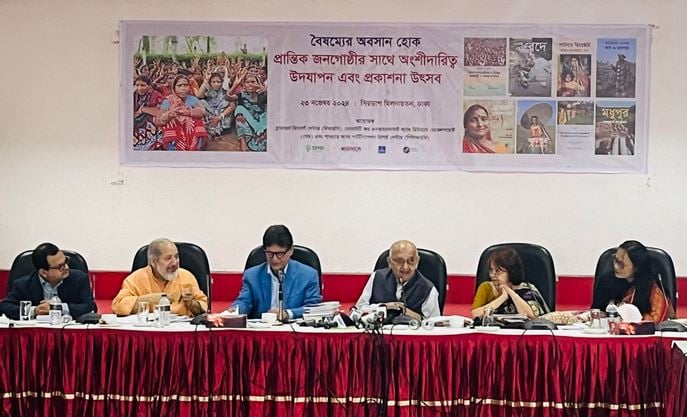
DHAKA, Nov 23, 2024 (BSS) - Speakers at a discussion here today suggested working out a plan to address discrimination the country's marginalized communities are facing for years, saying that the issues should get priority to the government's ongoing reform efforts to build a discrimination free country.
The speakers comprising academics, economists and rights activists underscored the need for allocating land for landless people, prioritizing social dignity of marginalized communities and carrying out the reforms activities ensuring equality for all.
"I have been hearing about the crises and discrimination with the marginalized communities since 1960s. The anti-discrimination and reforms drives can be commenced through addressing the issues of small communities as it will be easier to make plans and execute them as size of the population of such minorities is small," noted economist Professor Dr Rehman Sobhan said a discussion at CIRDAP International Conference Centre here.
About the exploitation of tea workers, Rehman Sobhan, also founder of centre for Policy Dialogue (CPD), suggested sharing the ownership of tea gardens with the dedicated workers, saying, "Sharing some stakes with workers can minimize the crisis ... the workers will also be encouraged to work with utmost dedication and promise in the tea estates."
He said the problems related to land issue in Chittagong Hill Tracts (CHT), salary issue in the tea estates and other issues have been risen before the Liberation War, adding, "We thought that through the Liberation War the problems will be solved ... but unfortunately, even after so many changes in political context, nothing improved, rather discriminating is increasing day by day".
Society for Environment and Human Development (SEHD), Brattyajan Resource Centre (BRC) and Power and Participation Research Centre (PPRC) organized the discussion on the protection of marginalized communities.
The state must listen to the voice of marginalized communities to realize the depth and dimensions of the problems they have been facing for years, said Power and Participation Research Centre (PPRC) executive chairman Dr. Hossain Zillur Rahman.
A key demand of the communities is to ensure fairness and dignity while carrying out the reforms, he said, adding, "The people have been fighting to establish their dignity for a long and thus, dignity must be established for the people along with eliminating discrimination".
Mentioning that the land management system has not been developed properly during the transition from the British period, Barrister Jyotirmoy Barua said, "It's not fair that any citizen remain homeless or landless in a country. The state has enough capacity to allocate land for each citizen".
No one will be allowed to be recruited to any government job without a permanent address which is not possible without having land, he said, adding, "The landless people must be rehabilitated through providing them with lands by the state".
SHED director Philip Gain presented the keynote speech in the discussion while CPD Fellow Professor Rounaq Jahan, BRAC University Professor Syed Mesbahuddin Hashemi and Head of media and communication department of Independent University, Bangladesh (IUB) Prof Dr Zakir Hossain Raju addressed it as special guests.
Representatives from a number of communities including Adivasis or ethnic communities, tea workers and their communities, sex workers and transgender, Kaiputra (pig rearing community), Rishi, Bede, Harijan, Jaladas and Bihari took part in the discussion.
Former general secretary of Bangladesh Cha Sramik Union (BCSU) Rambhojon Koiri, CHT Youth Headman-Karbari Network president Joya Tripura, Parittran executive director Milan Das and Bangladesh Harijan Oikkya Parishad president Krishna Dal addressed the discussion as community voices.